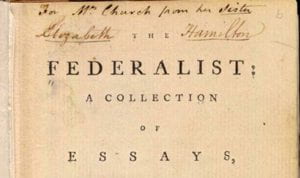By: Zachary Frederick

For my discussion of the writing element of first act of Hamilton, I will be looking at two different aspects: some of the creative liberties taken when recounting history, and how one’s point of view dramatically changes how history is remembered.
First, one of the most important considerations in the writing of a “historical” piece such as Hamilton is how accurate the story adheres to events and details that actually transpired. So far, the show has done an exceptional job in combining significant research into the historical accuracy of the piece, and has left little room for debate regarding any “major” errors – there simply aren’t any. However, the show cannot be perfect. Some elements of history must be altered in order to be effective in keeping the shows nature as a play. For example, several times in the first act viewers might recognize that what the song depicts might be a very rapid recounting of a succession of events that could have taken even months to come to fruition. This is notable in songs such as “Aaron Burr Sir,” where we meet Burr as well as most of Hamilton’s friends. Obviously this series of events did not take place in such a rapid succession, however for convenience sake the play understandably can be lenient in historical scrutiny during instances such as these.
Second, I enjoy how the play explores the idea that history changes depending on who is giving the account. In “Helpless” as Eliza recounts the beginnings of her relationship with Hamilton, the story is told as dreamy, romantic, and almost fairy-tale like as Hamilton and Eliza fall in love and get married. Everything is given a picturesque filter, even joking about the clearly evident jealousy of Angelica. However, Angelica’s point of view in “Satisfied” tells a completely different story of the same events. This recollection confesses Angelica’s love for Hamilton, and her conscious decision to reject her own feelings and give Hamilton up to marry her sister. Whereas Eliza only knows how she so “helplessly” fell in love with Hamilton, Angelica’s story gives insight to a selfless narrative we would not have been privy to having evaluated the situation from one point of view only.





